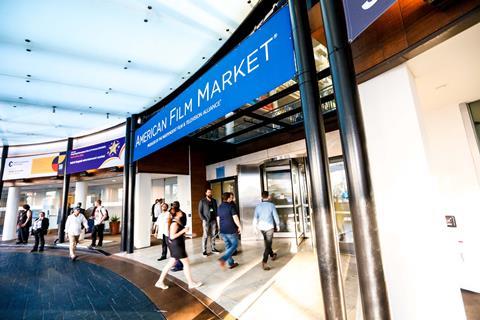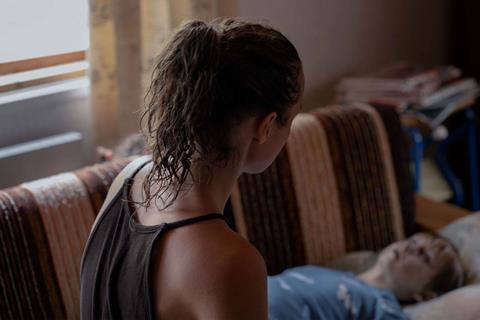
Executives and filmmakers are looking forward to the return of an in-person American Film Market (AFM, November 1-6) for the first time since 2019. After all, who doesn’t like being beside the seaside in Santa Monica in November? However, this being the independent space at a time of change, there are challenges ahead.
The strong US dollar and a bruising exchange rate with the British pound and the euro, which has almost reached parity in recent weeks, means buyers from the UK and parts of Europe will be more conservative when they pore over what is expected to be a modest offering of new sales titles and packages punctuated by several A-list must-haves. It is going to be a big reversal for buyers used to coming to the US and enjoying a favourable exchange rate. As Highland Film Group’s president of international sales Todd Olsson puts it, while these things are cyclical, it will force them to think deeply. “From a pure exchange rate standpoint, it’s about planning and where they think they’re going to be when [films] are delivered to them,” he says.
Ongoing concerns about the pandemic means there is not expected to be a large contingent from parts of Asia and in particular China, where president Xi Jinping just decreed the country’s zero-Covid policy requiring arrivals to quarantine for a minimum of 10 days will continue for the foreseeable future. Proof could be seen at the recent Busan International Film Festival and parallel Asian Contents & Film Market, where Chinese attendees were thin on the ground. That means lower sales projections from the region, as is the case with Russia while the war in Ukraine continues.
The pandemic appears to be waning but its game-changing impact on cinemagoing in the past three calendar years remains a concern. Top Gun: Maverick and the Marvel films have shown tentpoles continue to be in rude health alongside the occasional breakout such as Everything Everywhere All At Once, but it is the independent tentpoles and in particular arthouse releases that face challenges.
Will older, more vulnerable audiences return to the aisles? There have been encouraging signs from awards season contenders TÁR, Triangle Of Sadness and Till in the US, but there is still a way to go until distributors of smaller films can exhale.
Streamers are undergoing considerable change as Netflix prepares to launch its ad-supported tier and parent companies like Warner Bros Discovery restructure. Deep-pocketed platforms and studios continue to snap up and retain on-screen talent and crews, creating a shortage that independents feel acutely.
Like many savvy companies, the UK’s Cornerstone Films has shifted strategy in recent years to board projects at development stage so it can work with filmmakers to get projects market-ready.
“We try to work closely with talent and particularly filmmakers,” Cornerstone co-founder Alison Thompson explains. “On Good Luck To You, Leo Grande, we brought on [director] Sophie Hyde because we worked on her previous movie Animals and thought she would be a brilliant fit for Leo. If you have that cornerstone, then that makes it easier to build out a project.”
The Emma Thompson-Daryl McCormack two-hander premiered at Sundance Film Festival in January, where it was acquired by Searchlight Pictures before bowing on Disney’s Hulu in the spring. Its awards prospects looked in danger when Ampas reverted to its pre-pandemic requirement that a film have a seven-day theatrical release before showing on a streaming platform. But Searchlight lodged a successful appeal with Ampas to put it back in the race, and the film is rolling out theatrically outside the US on the back of strong word-of-mouth thanks to — as Thompson puts it — “the brilliant marketing machine that is Searchlight”.
Emma Thompson’s performance is now back in the best actress race, and Cornerstone’s co-founder points out the presence of McCormack broadens Leo Grande’s appeal beyond an older female demographic. “Where we used to focus on a lot of movies for the older female audience — and that is a good theatrical business to be in — the evidence suggests that older audiences are going to be slower to come back to cinemas than younger audiences, and so we’re actively working on material that we feel can have broader appeal or material that can appeal to younger audiences as part of that strategy,” says Thompson. Cornerstone’s UK creature feature Unwelcome, directed by Jon Wright, recently premiered at Spain’s genre-led Sitges Film Festival and is being distributed in the UK by Warner Bros.
Packages on the table

Deep-pocketed streamers and studios can take a package off the table whenever they want — Netflix and Apple were involved in splashy package buys in Cannes, and Focus Features paid $30m for Alexander Payne’s The Holdovers in Toronto. But the current thinking is they are generally more interested in producing in-house.
Furthermore, Netflix’s subscriber woes and the imminent launch of its ad-supported tier do not necessarily portend a stampede to cinemas. The cost-of-living crisis will bite even harder if reports of a recession in the next 12 months come true.
Streamers by and large have forced windows to shrink and this will continue to be a factor in independent deal-making. In France, Disney recently described the media chronology laws as “anti-consumer” and warned it may release some titles straight onto its Disney+ platform unless shorter windows are introduced to mitigate the risk of piracy (and keep subscribers happy).
This being said, the mood among the industry surveyed by Screen International remains buoyant. Cannes was busy and there was an enthusiastic turnout at the in-person return of Toronto, where sales agents teed up AFM sales launches, screened completed films, and closed outstanding territories on available titles.
“It’s really nice to be coming back,” notes TrustNordisk managing director Susan Wendt, who has enjoyed strong returns at AFM with sales launches, promos and teasers on disaster films such as Roar Uthaug’s The Wave and John Andreas Andersen’s The Quake.

TrustNordisk is bringing to AFM Ole Bornedal’s thriller Nightwatch — Demons Are Forever, a sequel to 1994 hit Nightwatch that has been shooting in Denmark and stars Nikolaj Coster-Waldau. The slate also includes Nikolaj Arcel’s historical drama The Bastard with Mads Mikkelsen, and Thea Hvistendahl’s Handling The Undead, which has Neon on board for North America and stars Renate Reinsve and Anders Danielsen Lie from The Worst Person In The World.
Wendt is paying close attention to audience numbers, noting the drop in admissions in parts of Europe. “I don’t know whether they will get back to 100%,” she says. “We can see that certain films are still working. Another Round was a great example during the pandemic.”
Finding a way forward requires ingenuity. “It’s a question of co-operation. Everyone needs to be a bit more creative to try to get those people back to the cinema because it takes time,” says Wendt. “We need to engage young audiences while they’re at school age. The streamers will stay and windows might get shorter and there is a world where everything can co-exist — some films deserve and need theatrical and for others it’s not necessary and the window can be shorter.”
Cornerstone’s Thompson agrees that creativity is crucial and advocates for an open-minded approach. “We actively choose to work on films that can be made in a finance-friendly way, which means shot and produced in countries with great tax-credit deals,” she says. “Mafia Mamma was shot entirely in Italy, which has a 40% tax credit for international productions. There are similar tax incentives in places like New Zealand and Australia, where we make many of our films. We aim to be strategic about where and how we put our films together and how we can put as much money on the screen as possible.”
Absentees are top of mind for Highland Film Group’s Olsson. “Markets go through different phases but everybody’s talking about the softness of Asia. Only the very top films get picked up in South Korea and Japan now,” he says.
The impact of Covid on the regional theatrical business combined with growing local production activity make buyers pickier, in particular those from China and Southeast Asia.
Olsson expects a “dynamic” AFM and besides new sales titles such as Nicolas Cage survival thriller Sand And Stones, which starts production in Ireland this month, he will be screening Andy Fickman’s One True Lovesstarring Simu Liu and Phillipa Soo, and Herbert James Winterstern’s Supercell with Alec Baldwin and the late Anne Heche. Russell Crowe thriller Land Of Bad is currently shooting in Australia.
Producer and Cold Iron Pictures founder Miranda Bailey, whose Thandiwe Newton thriller God’s Countrypremiered to excellent reviews at Sundance and had a US release via IFC Films, has Bankside Films continuing to pre-sell Oren Moverman’s Groucho Marx biopic Raised Eyebrows, which will benefit from the California tax credit and stars Geoffrey Rush, Sienna Miller and Charlie Plummer.
Bailey likes to work in the sub-$5m budget zone and notes that while it is tough to get talent and crews, Netflix’s subscriber losses have sparked “baloney” talk about how hard it is to secure financing. “I made four films and a TV series during the pandemic. I’ve got two movies in pre-production right now. The sky is not falling.”

























No comments yet